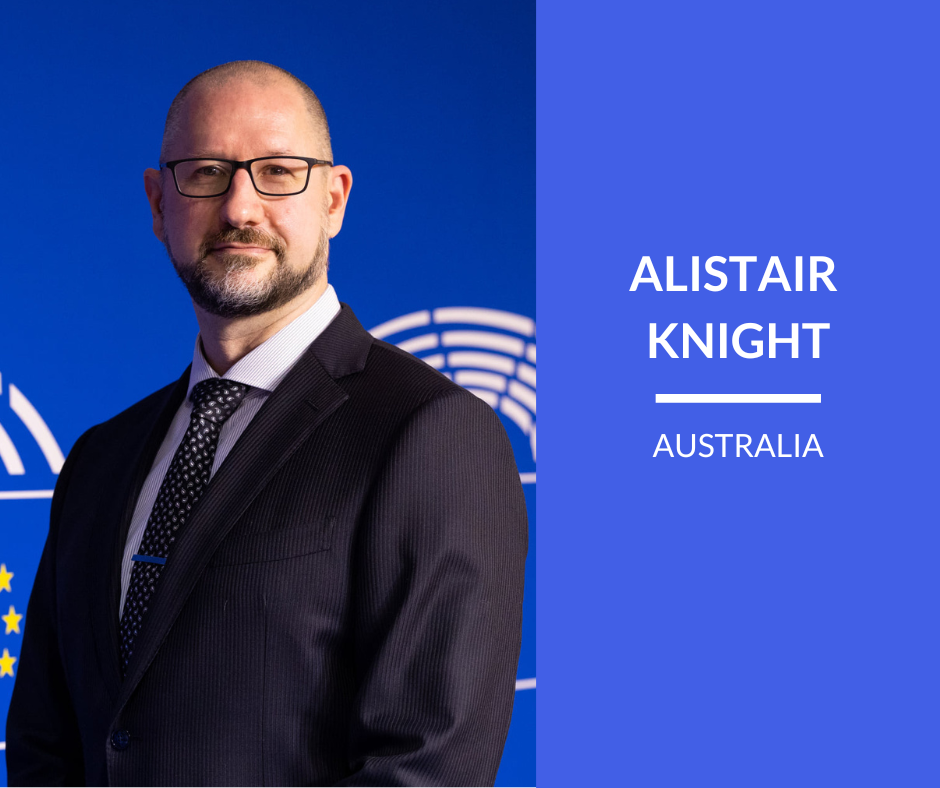EUVP Visit Story – Alistair KNIGHT
 Are you considering applying for an EUVP visit? Ever wondered how EUVP programmes are organised and what their outcomes are? Follow the “EUVP visit stories”, featuring unique reports and testimonials from those who have joined us at the heart of the EU! Today, we take a look back at the EUVP visit of Mr Alistair Knight from Australia, who participated in the EUVP programme in February 2022.
Are you considering applying for an EUVP visit? Ever wondered how EUVP programmes are organised and what their outcomes are? Follow the “EUVP visit stories”, featuring unique reports and testimonials from those who have joined us at the heart of the EU! Today, we take a look back at the EUVP visit of Mr Alistair Knight from Australia, who participated in the EUVP programme in February 2022.
As Director for Europe and Sub-Saharan Africa within Australia’s Department of Home Affairs, the EUVP provided me with a unique opportunity to engage with counterparts within EU institutions beyond my Department’s traditional partner – the European Commission’s Directorate-General for Migration and Home Affairs. Engagement with counterparts from the European Parliament, European Commission, and the European External Action Service enabled discussion of shared contemporary transnational security challenges such as: the crisis in Ukraine, countering foreign interference, economic resilience and opportunities to encourage market diversity, critical infrastructure protection, the EU’s Global Gateway Strategy, and the EU’s capacity building programs in Africa and the Indo-Pacific.
The program was comprehensive and well targeted, resulting in the identification of clear avenues for expanded cooperation between Australia and the institutions of the European Union. During my discussions it was readily apparent that both Australia and the EU were aligned in our belief that collective action is required to enhance economic resilience and deter the use of economic coercion by authoritarian regimes. Moreover, together with my interlocutors, we identified further opportunities for cooperation between Australia and the EU on matters related to legislative or regulatory approaches to countering foreign interference, protecting the integrity of our democratic political processes, and encouraging market diversity.
I found discussions on the proposed European Cyber Resilience Act and the European Media Freedom Act as well as insight into the EU’s engagement with industry on the matter especially enlightening. The European Union’s advocacy for industry to adopt more socially responsible perspectives and prevent the monopolisation of critical and emerging technologies was especially welcome.
In addition, the side-visit to Paris and discussion at Jean Monnet’s House was greatly appreciated. It provided useful context on the origins of the EU which helped me appreciate the EU’s contemporary approach to many issues. It also provided a valuable method to get to know my fellow participants in a casual environment and build interpersonal relationships that will be useful throughout my career.
The EUVP was an immensely valuable opportunity and I can now be considered an advocate for the ‘Brussels Effect’ – namely the EU’s unique ability shape global regulatory processes and international norms while insisting on strong human rights protections. Given the rapid pace of technological develop and the pervasive nature of the internet in our daily lives, I am relieved that the EU is prepared to champion these values in the face of competition from autocratic regimes.
Participation has enabled me to identify many opportunities for expanded bilateral collaboration across a broad suite of shared challenges. I was particularly impressed with the EU’s willingness to champion democratic values and human rights on the global stage, providing much needed leadership on this issue. The success of the EUVP is best evidenced by the fact that it has since sparked planning for a series of follow-on meetings between counterparts to explore common interests in more detail.
